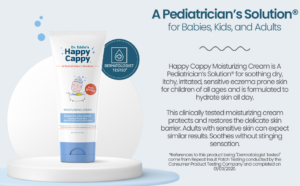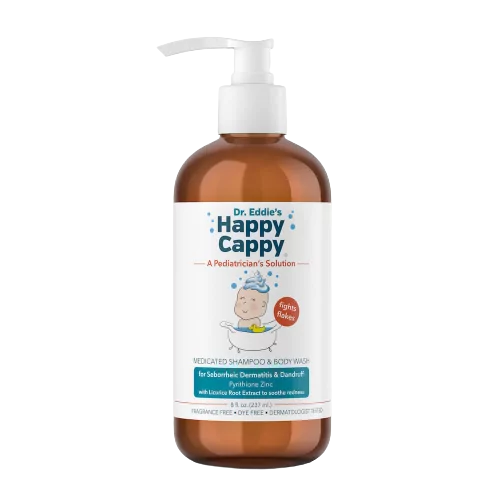What Is Dry Skin?
Dry skin, in scientific terms, is known as Xerosis or Xeroderma. It is simply your skin becoming rough, scaly and irritated due to a lack of moisture in it.
The skin has a protective barrier that protects it from outside irritants and allergens, helps retain moisture, and keeps it soft. But when this skin barrier becomes impaired for any reason, from age, weather, or skin conditions (we will discuss them later in the article.), the skin is unable to retain moisture and becomes dry.
Dry skin may feel and appear as rough patches or can form flaky scales on the skin. If proper care and attention are not provided, then the skin can even crack or bleed due to dryness.
How Do I Know If I Have Dry Skin?
Dry skin may appear differently on everyone. It varies based on age, skin tone, environment, and your health. But some of the common symptoms that can help you identify dry skin are.
- Roughness
- Skin tightness
- Itchy skin
- Redness (lighter skin tones)
- Ashy skin (in darker skin tones)
- Flaking and scaling
- Skin peeling
- Cracked skin
- Bleeding (in severe cases)
What Causes Dry Skin?
The main cause of dry skin is a lack of moisture in the skin. There are many reasons for this. We have listed some of the most common causes for you.
1. Age
Aging is a natural part of life. Aging can cause changes to our body, hormones, and the skin. As we age, the metabolic system of cells in our skin slows down, which causes loss of moisture and elasticity in the skin. It mostly happens after the age of 25.
Because of this, the skin barrier also weakens, and the sebaceous oil glands cannot produce adequate sebum. This ultimately leads to rough, dry, itchy skin.
2. Weather Conditions
The weather has a great impact on the skin’s hydration. When there is a lack of moisture and humidity in the air, it causes the skin to become dry. This is why dry skin worsens during winter due to the lack of humidity in the environment.
In summer, the air becomes dry due to the hot temperature and causes the skin to lose its moisture through sweating and heat.
3. Irritants
There are certain irritants, such as fragrances, dyes, and chemicals in skincare products, that can cause dry skin. This condition is medically known as irritant contact dermatitis. When the skin comes in contact with these irritants, it considers them harmful to the skin. And as a reaction, it causes dry, itchy, irritated skin.
4. Genetics
This is something you can blame on your parents and get away with it. Dry skin can also be inherited and caused due to genetics. A protein called filaggrin is responsible for hydrating the skin. Mutation in genes that control this protein can cause dry skin and prone to developing skin conditions like eczema.
5. Dry Air
Dry air, whether inside or outside the house, can strip away moisture from the skin more quickly, causing it to become dry. The use of a central heating system and air conditioners in the house can dry up humidity from the air, causing it to become dry.
6. Immune System
Immune system disorder or an overactive immune system can cause the skin to become dry. Our immune system protects our body from harmful bacteria and substances by releasing certain types of cells.
Sometimes, there are certain things, such as metal, nickel, and pollen, that are not harmful to our bodies. However, if there is an overactive immune system, when the skin comes in contact with those substances our body may consider those things as dangerous, and as a result, the skin becomes sensitive, inflamed, and dry.
7. Dehydration
Dry skin can be a symptom of dehydration. Dehydration refers to a lack of water in the body or skin. The body needs an adequate amount of water supply to work properly.
When one does not consume an adequate amount of water it can contribute to the skin becoming dry, rough, and itchy.
8. Certain Medical Conditions
Certain medical and skin conditions can make the skin more prone to dryness. We have mentioned some of the most common skin conditions to help you identify which one might be causing your dry skin.
Eczema is a skin condition that causes red, itchy, dry rashes on the skin. Eczema, also known as atopic dermatitis is caused by a combination of factors such as genetics, environmental factors, skin barrier dysfunction, and stress.
Anyone can experience eczema, but it is more common in children under the age of 5. Eczema is a chronic condition which means it may come and go from time to time in the form of eczema flare up.
Eczema in babies commonly appears on the face, on the outside of elbows and knees, and on ankles and wrists. Eczema in older kids and adults can appear on the eyelids, the hands, on the inside of the elbows and knees, and on the ankles. Some common symptoms of eczema apart from dry skin are:
- Itching
- Skin inflammation
- Rashes (may appear as red or pink on lighter skin tones and purple or brown on darker skin tones)
- Cracked skin
- Thickened skin (known as “lichenification”)
- Skin oozing fluid (in severe cases)
Causes dry, flaky skin on the scalp and other parts of the body. Seborrheic dermatitis can be considered a severe case of dandruff. Seborrheic dermatitis in babies is known as cradle cap.
It mostly appears on the scalp but can also appear on the face, behind the ears, on the eyebrows, in folds of the arms and legs, and in the belly button.
The exact cause of seborrheic dermatitis is unknown but is believed to be caused by overgrowth of Malassezia yeast. This yeast, when combined with sebum on the skin and scalp, results in flaky, scaly patches.
Some of the common symptoms of seborrheic dermatitis are:
- White or yellow colored flakes
- Thick, greasy scales on the scalp (cradle cap in babies)
- Mild redness under the scales
- Flaky patches
- Inflammation
Contact dermatitis is one of the common types of eczema. When the skin reacts to a certain allergen or irritant it is classified as contact dermatitis.
When the skin comes in contact with any allergen, such as poison ivy, pollen, and poison oak, the body’s immune system reacts causing itchy rashes. This is known as allergic contact dermatitis.
However, sometimes the skin gets irritated, and itchy dry patches appear on the skin when it comes in contact with an irritant such as fragrance in perfumes and chemicals in skincare products. This reaction is known as irritant contact dermatitis.
These rashes may appear within minutes or after a few hours and usually last for 2 to 4 weeks. Some prominent symptoms of contact dermatitis are:
- Cracked, dry skin
- Blisters
- Redness (in lighter skin tones and in darker skin tones, the skin may appear purple or brown.)
- Itching
- Swelling
- Burning sensation
- Small bumps that may ooze
Athlete’s foot or tinea pedis is a fungal infection that usually appears on the foot, specifically between the toes. It can also appear on the heels, soles, and top of the feet as red, dry, itchy skin rashes.
Anyone can experience an athlete’s foot, but it is more common in people with sweaty feet and tight-fitted shoes. The worst thing about tinea pedis is that it is contagious. This means it can spread from one person to another, mostly in the gym.
The following symptoms can help you identify athlete’s foot:
- Dry skin
- Itchy skin
- Burning or stinging sensation
- Cracked skin
- Mild redness or ashy skin
- Rashes
Psoriasis is a skin condition that is caused by an autoimmune disorder. A certain type of cells, also known as T-cells, are responsible for protecting our body from outside bacteria and viruses.
When a person is experiencing psoriasis, the immune system is overly revved up, and these T-cells mistakenly attack our body’s skin cells. This causes the development of new skin cells that proliferate faster than usual.
The dead skin cells are unable to shed from the skin before the new ones form, which creates scaling and flaking on the skin. Psoriasis may appear on the elbows, knees, face, scalp, fingernails, lower back, feet, and hands.
The most common symptoms of psoriasis are
- Dry skin
- Itchy skin
- Raised thick skin patches
- Discolored skin
- Stinging or burning sensation
-
Kidney Disease
When a person is experiencing kidney disease, their kidney is unable to filter the blood as a healthy kidney might do. This causes the skin to become itchy due to the buildup of toxins in the body.
The kidney dysfunction allows for excess phosphorus in the body, which causes the skin to become dry, rough, and irritated. Some other common symptoms that may appear on the body as the disease progresses are
- Rashes
- Discoloration of skin
- Blisters
- Swelling on body parts like hands, feet, and legs
- Skin Tightening
How Will Dry Skin Affect The Body?
Dry skin can form as small dry skin patches or can affect the whole body at the same time. It causes the skin to become rough deviating from its normal softness. Sometimes, it can also cause discoloration of skin, which appears as red rashes on lighter skin tones and purple or brown rashes on darker skin tones.
Dry skin causes the skin to become thin, tight, and fragile, so it can easily crack. These cracks can also turn into painful sores and bleeding. As soon as you suspect that you might be experiencing dry skin, start taking extra care of it to avoid future complications.
How To Get Rid Of Dry Itchy Skin?
Now that you know what might be causing your dry skin, let’s take a look at how to reinvigorate it. You can easily manage dry skin at home by following a proper skincare routine that includes.
Cleansing
Cleansing should be the first step in your skincare routine.
- Cleanse your skin with a gentle, mild cleanser at least twice daily.
- Once in the morning and once before going to bed. Cleansing the skin helps remove excess oil, dirt, and dead skin cells.
The dirt and excess dead skin cells can build up on the skin and worsen the condition by scaling and flaking.
The best cleanser for dry, sensitive skin is one that is fragrance-free, gluten-free, paraben-free and contains natural ingredients that help soothe the skin.
Happy Cappy Daily Shampoo and Body Wash for Dry, Itchy, Eczema Prone Skin is specially formulated to soothe dry, sensitive skin. It contains natural ingredients like licorice root extract, apple fruit extract, glycerin, hyaluronic acid, aloe vera, and provitamin B5 that help soothe itching, dryness, irritation, and redness associated with eczema.
Exfoliation
Exfoliation is essential for removing dead skin cells from the skin. Some stubborn skin scales may not be removed just by cleansing. Exfoliation can help remove them. Exfoliation also helps make way for the moisturizer to penetrate more easily into the skin.
- Exfoliate your skin 2 to 3 times a week.
- Don’t over-exfoliate it can worsen the condition.
- Use a gel or lotion exfoliator for dry skin.
- Never rub your skin vigorously while exfoliating.
Moisturizing
Moisturizing creams are one of the best inventions the world has seen, especially for people who are experiencing dry skin or eczema.
Moisturizing helps rehydrate the skin, works as a protective barrier on the skin, and keeps the moisture inside the skin.
- Moisturize your skin at least twice daily.
- Moisturize every time after washing your skin.
- The best time to moisturize is after the bath. The skin can retain more moisture at that time.
- If you suspect that your skin is becoming dry more often, you can use it more than twice daily.
- Using a non-greasy and fast-absorbing moisturizer may lead you to use it more often
- Make sure the moisturizer is free from harsh chemicals.
If you are experiencing dry skin due to eczema, then try using Happy Cappy Moisturizing Eczema Cream. It helps soothe dry, itchy, irritated, sensitive, eczema-prone skin and keeps it hydrated all day long. It is a clinically tested moisturizing cream that protects and restores the delicate skin barrier and is suitable for all ages.
If you have made these modifications to your skincare regimen and your condition is not getting better, then consult your doctor. They may prescribe topical steroid ointments or other prescription creams to relieve itching, redness, and dry skin.
Best Moisturizer For Dry Skin

There are several moisturizers available in the market for dry skin. But which one should you choose?
The best moisturizer for dry skin is the one that is
- Fragrance-free
- Hypoallergenic
- Free of allergy causing preservatives
- Lanolin-free
- Sulfate-free
- Topical Antibiotic-free
- Paraben-free
- Soy-free
- Dye-free
- Propylene glycol-free
- Balsum of Peru-free
- Contains the appropriate natural ingredients
Natural ingredients like glycerin help infuse moisture in the skin and licorice root extract helps soothe redness on the skin. Moisturizers like Happy Cappy Moisturizing Cream are a great option to choose from and adheres to the bullet points listed above. According to the American Academy Of Dermatology, a moisturizer that is in the form of cream (as opposed to a thinner lotion) is a better option for dry, eczema-prone skin.
Conclusion
Dry skin is caused when there is a lack of moisture in the skin. This can be caused due to a number of common factors, such as aging, dehydration, irritants, dry air, genetics, and weather conditions.
Dry skin might also be caused due to certain medical or skin conditions such as eczema, seborrheic dermatitis (cradle cap), contact dermatitis, athlete’s foot, psoriasis, and kidney disease.
Dry skin can be easily managed at home by taking proper care of the skin. Follow a proper skincare routine that includes cleansing, exfoliating, and moisturizing. If your condition does not get better with these, consult a dermatologist who can prescribe the appropriate medication.
FAQs
What is the main cause of dry skin?
The main cause of dry skin is a lack of moisture in the skin. This might be caused due to a number of factors, such as skin barrier dysfunction, dehydration, aging, weather conditions, or a skin condition like eczema, psoriasis, and contact dermatitis.
How to prevent skin from becoming dry?
The best way to prevent skin from becoming dry is by keeping it moisturized. Even when you are not experiencing dry skin, moisturize it at least twice daily. This will prevent it from becoming dry.
Can drinking water help dry skin?
Drinking water is good to maintain the appropriate state of hydration in your body, but to manage dry skin, you really need to keep it hydrated on the outside as well. Moisturizing the skin will help build a protective layer on the skin that will help keep moisture in it.
Which lotion is best for dry skin?
A moisturizer in the form of a cream is better than the one in the form of a lotion for dry skin. A moisturizer free from harsh chemicals such as fragrance, dyes, parabens, and sulfate is best for dry skin. The moisturizer should be non-greasy and fast-absorbing.











